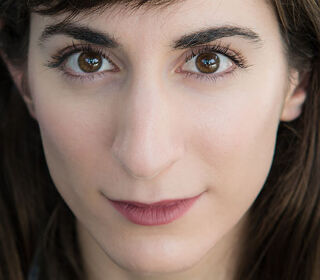
Blog

Our Postgraduate student, Dara Silverman, decided she wanted to come and join Royal Birmingham Conservatoire all the way from New York City to study our Masters of Fine Arts Acting course! Find out why she chose to study here, what exciting projects she’s working on and what her plans are for the future.
Why have you chosen to study your postgraduate course?
I came to this programme as an actor, director and teaching artist. I have been fortunate to have been consistently employed as an independent contractor for the past five years with my undergraduate degree and I wanted to go higher. I aspire to teach theatre in high schools and to eventually reform nationwide education; to do so in America requires a Master’s level degree.
Why did you choose to study at Royal Birmingham Conservatoire?
I first saw the Royal Birmingham Conservatoire Acting MFA page when I was sitting at my dining room table two years ago, looking at postgraduate programmes. I was curious about international programmes, particularly based in the UK and I fell in love with the course. I wanted a programme which was more of a traditional conservatoire style, featuring classes in a wide variety of skills and styles and the Birmingham School of Acting’s two-year MFA programme fit the bill!
My husband was also looking at British postgraduate acting programmes, so we both emailed the Course Leader, Alex Taylor, and planned a trip to Birmingham to learn more! Alex, very graciously, met with us, auditioned us and accepted us both on site. In our conversation that afternoon, I knew that Alex was someone that I very, very much wanted to study with, learn from and forge a post-degree friendship with.
Where did you study your undergraduate degree?
I did my Undergraduate work at Skidmore College in Saratoga Springs, New York.
How is your undergraduate course different to your postgraduate course?
My undergraduate degree is from Skidmore College in upstate New York: I graduated with a theatre major, confirmed by a Bachelor of Science degree. Skidmore is a liberal arts college: in that format, students pursue a major (or multiple majors, a major and a minor, or whatever combination they choose), and take required non-major related general education courses. The theatre department encouraged concentrations, but was not a conservatoire-style programme: students concentrating in acting were encouraged to take lighting and costume design classes; whereas, students concentrating in stage management were encouraged to take voice classes and so on.
I gained a wide variety of skills which I use every day in my work as an education artist: I am so thankful to lead by example, teach my students that a theatre artist can be flexible in form and function. For my postgraduate course, I am now grateful to have the chance to gain more acting specificity and practice my craft in a deeper, more specialised manner.
What exciting projects are you working on at the moment?
I’ve just finished my major project and I’m very proud of the work I’ve done! I had the opportunity to write an original creation myth and use that story to develop a creativity workshop aimed at American elementary and middle schools. The workshop is two-pronged: one prong would be an in-school workshop for the students, whereby I would share the origin story I’ve written and the students would be challenged to create their own story as a class, performing it as enormously and bravely as they can. The second prong is a professional development workshop for teachers and school administrators, investigating all the ways to deliver their required curricula in new and engaging techniques.
Are there any projects you are particularly looking forward to?
The second year of the Acting MFA course is entirely performance based and I am so excited: we will have the opportunity to perform in three fully produced plays and I cannot wait to stretch my wings, try out the new skills I’ve learned and just play.
What skills have you acquired from your postgraduate course?
I have, undoubtedly, acquired new singing skills! I grew up in musical theatre, but have always been a much stronger dancer than singer. Singing is such a big part of the Acting MFA programme and it’s taught largely through one specific methodology. By having the skills I’ve gained through this programme, I don’t feel as frightened of singing auditions.
What would your advice be to students who are starting their postgraduate degree soon at Royal Birmingham Conservatoire?
Royal Birmingham Conservatoire, particularly the Acting department, is such an incredible training ground: the programmes are designed thoughtfully, the courses are taught expertly and the training you’ll receive is beyond comparison. The greatest resource, though, is the people. The tutors are so generous of their time, energy and thought; I encourage you to engage with them as frequently as you can! Also, explore every inch of this incredible city: Birmingham is brimming with hidden gems and I’ve learned something new every day where I’ve ventured out.
What are your plans for the future?
I plan to return to America: an MFA degree will allow me to pursue in-school teaching positions and that is what I want most. Further down the road, I’d like to use what I’ve learned about acting, imagination, creativity and empathy to work towards education reform.
Conservatoire Courses
Find out more about our courses